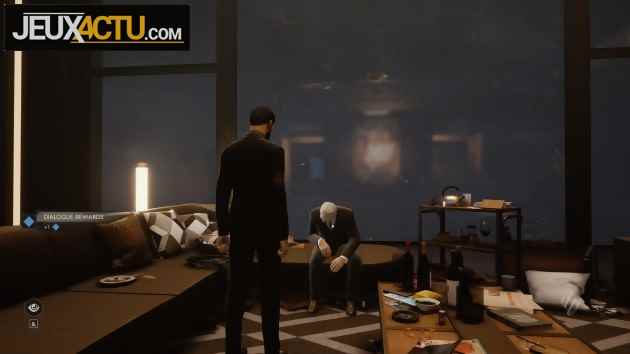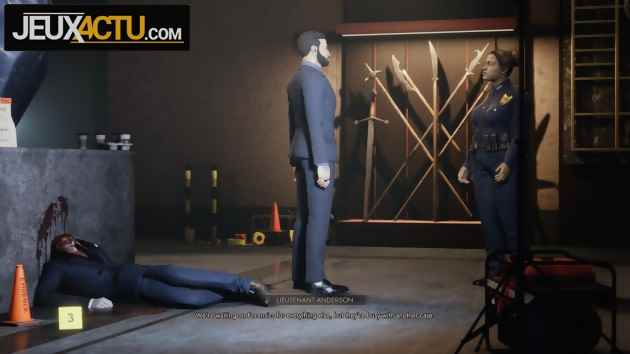The adventure will offer us to play three vampires alternately, including Emem Louis from the Toreador clan and Leysha from the Malkavian clan. But it is Galeb Bazory of the Ventrue clan that we have been able to take in hand for the moment. At the controls of this handsome, bearded dark-haired man, we went up and down, across and several times in a row the second chapter of the game. Without going too much into the details of the story (which, preview obliges, escapes us completely manner), know that the dark vampire was dispatched by the Prince of Boston in person to investigate at a certain Jason Moore, found beheaded in his luxurious residence, and to recover five compromising files there. This starting point gave us the opportunity to discover clever gameplay, which mixes the codes of adventure games and those of role-playing games, thus forming what the developers call a narrative RPG.
The first aspect results in a lot of puzzles to solve, with the latter being integrated into the story in a believable way. In this case, we were given the opportunity (or not, we will come back to this…) to look for clues about the body, to read many documents, to pick up several objects, to listen to different testimonies, to discover a secret safe, to unearth the combination, to flush out a ghoul disguised as a policeman, to find several very useful keys or to investigate the presence of a “panic room”. Exploration therefore plays an important role, the interactive areas being indicated by a discreet and elegant white dot. As for the scenes observable in close-up, a small movement of the camera can sometimes unearth a well-hidden object or document. No system of indices or virtual notebook being present, it is up to the player to take notes or to remember important information. If the developers allow themselves this freedom, it is because there are always several ways to achieve the same objective, and failing on a specific point does not lead to a dead end.
However, do not believe that the game offers any combat system. Here, it is the dialogues that act as confrontations, the verbal jousting replacing the punches or pistol shots too often seen elsewhere.
BLOOD FOR BLOOD RPG
 In this, the game is already beginning to reveal its highly role-playing character. The game also began with the distribution of experience points on a character sheet combining different attributes (physical, social and mental), skills (rhetoric, intimidation, persuasion, psychology, security, technology, deduction and education) and disciplines (presence, courage, domination and “sense the unseen”). We’ll spare you the details of all this for the moment, but be aware that each player will have access to certain options and not others depending on the skills they have favored. For example, observing a stain of blood on the decapitated body will not lead to the same description depending on whether you choose to simply examine it, or to appeal to your deduction (a necessary point in this case) or your education (two points required). And a blocked mobile phone will be immediately hackable by a tech expert, while players who have abandoned this skill will have to find the password somewhere. Already delectable as it is, these possibilities are all the more interesting as certain actions cost points of Willpower or increase the thirst for blood, called Hunger. However, it is advisable to keep the first gauge as full as possible (so as not to find yourself short in the most crucial situations) and to avoid filling the second (otherwise, the bestial nature of the vampire can become uncontrollable). Fortunately, it is possible to regain Willpower by using certain items, and to lower Hunger by feeding on a poor victim.
In this, the game is already beginning to reveal its highly role-playing character. The game also began with the distribution of experience points on a character sheet combining different attributes (physical, social and mental), skills (rhetoric, intimidation, persuasion, psychology, security, technology, deduction and education) and disciplines (presence, courage, domination and “sense the unseen”). We’ll spare you the details of all this for the moment, but be aware that each player will have access to certain options and not others depending on the skills they have favored. For example, observing a stain of blood on the decapitated body will not lead to the same description depending on whether you choose to simply examine it, or to appeal to your deduction (a necessary point in this case) or your education (two points required). And a blocked mobile phone will be immediately hackable by a tech expert, while players who have abandoned this skill will have to find the password somewhere. Already delectable as it is, these possibilities are all the more interesting as certain actions cost points of Willpower or increase the thirst for blood, called Hunger. However, it is advisable to keep the first gauge as full as possible (so as not to find yourself short in the most crucial situations) and to avoid filling the second (otherwise, the bestial nature of the vampire can become uncontrollable). Fortunately, it is possible to regain Willpower by using certain items, and to lower Hunger by feeding on a poor victim.
However, do not believe that the game offers any combat system. Here, it is the dialogues that act as confrontations, the verbal jousting replacing the punches or pistol shots too often seen elsewhere. When the time comes to extract information from an interlocutor, several options are displayed depending on the character’s skills (intimidation or psychology for example). But the game is not content with a stupid “on/off” system. A success rate is determined and displayed in advance, a function of concentration making it possible to increase the chances of success, at the cost of a few Willpower points. This principle finds its climax during the phases of Confrontations, where it is absolutely necessary to succeed in convincing an interlocutor under penalty of missing out on a whole section of the game. Here as elsewhere, the actions and choices of the player have real consequences. Moreover, during our various tests (all successful with regard to the main objective), we were able to save an important character once, saw him die in different ways three times, and did not meet his way again. All this depending on the clues found, the management of the Will and Hunger gauges, and the success or otherwise of certain dialogue phases. This is very promising for replayability, especially since the developers have confirmed to us that fifteen different endings await the main characters, and that seven or eight endings will concern the secondary characters. The magic of combinatorics helping, each player should therefore experience a truly different adventure. Moreover, Swansong has fun at the end of the mission to display the successful actions, those failed, but also all the alternative options that have not been explored. Perfect to make the player want to start again and again, a bit like a Hitman. Finally, note that on the script side we are promised many betrayals and other script twists, while the graphics that we were able to observe seemed sober but very elegant to us. We now look forward to dissecting the final version in more detail.


